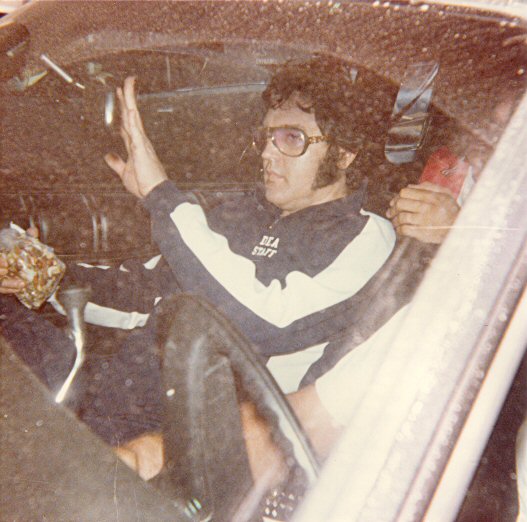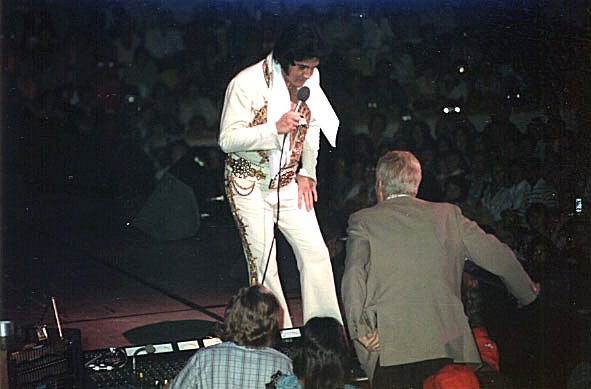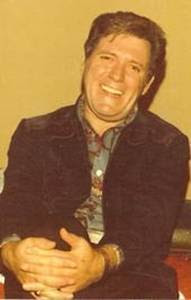In January 1969, Elvis Presley cut his last No. 1 tune, "Suspicious Minds." Just three weeks earlier, Frank Sinatra recorded a hit called "My Way."
The songs are an extreme contrast: one about loyalty and entrapment, the other an anthem of independence. They're also a pretty fair gauge of where America's two greatest pop singers stood at the time, if not forever.
This weekend, CBS launches the miniseries "Elvis." It's part of a media blitz that's extraordinary even by sweeps standards. The promotional props include an Elvis book, Elvis CDs, Elvis magazine inserts, an Elvis category on "Jeopardy!" tonight and an "Elvis by the Presleys" documentary next Friday.
Yet the figure still generating worship and revenue after all these years was — if we believe CBS's fascinating and wildly uneven version — as much to be pitied for what he might have accomplished had he only asserted himself.
"Elvis," which airs on KIRO at 9 p.m. Sunday and 8 p.m. Wednesday, follows Presley from his hardscrabble youth to 1968. The film was made with the full cooperation of the Presley estate and family, and the producers have conceived it as a classic show-biz tragedy of art and love vs. commerce and fame.
So firmly set in this tradition is "Elvis," older viewers will recall movies like "The Jazz Singer," and younger ones will think of "American Idol." The ingredients are remarkably alike and enduring, from weepy, supportive mothers to Faustian business managers to the penalty for straying too far from your roots.
The downside to this operatic approach is that Part 1 is far more interesting. Watching someone battle to the top is inherently better entertainment than watching him decline, especially if the overall conclusion delivers fizzle instead of bang.
Sunday begins by breathing intimacy into the working-class Presley family's existence on the wrong side of the tracks in a mixed-race neighborhood in Tupelo, Miss. Later, they move to Memphis, Tenn.
It's a small universe in which the word of Gladys (Camryn Manheim) is law, and she often overrides husband Vernon (Robert Patrick) in favor of their teenage son and only surviving child — you-know-who.
Manheim and Patrick add grace to somewhat limited parts. But as has been proven since time immemorial and Vivien Leigh, English-speaking actors from across the Atlantic have an uncanny knack for playing Southern characters.
Irish star Jonathan Rhys Meyers ("Bend It Like Beckham") inherits the crown with an eerie evocation of the King, from his pouty good looks to his low-pitched drawl and deep-seated allure. Meyers does not attempt to put interpretive spin on Elvis, but profoundly inhabits him, exposing past Elvis imitations as parody.
Nearly on a par is Randy Quaid, who plays "Colonel" Tom Parker (hiss! boo!) like the former carnival barker he was: oily, beguiling and quick to turn mean. So snakelike is Quaid's Parker, you feel sorry for Sun Records' Sam Phillips (Tom Guinee). He hasn't a chance to keep his new discovery once Parker wants Elvis.
The arrival of Parker on the scene comes nearly halfway into Part 1, after some delightful scenes in which Rhys Meyers lip-synchs and dances to some early Elvis tunes performed at fairs and on the country music circuit in the mid-'50s. We get to see Elvis' fanatical belief in himself and his loyalty to others, qualities instilled by his parents.
But "Elvis" is not a psychological movie in the delving sense. It goes no deeper than a modern-day TV talent show, where each performer is assigned a simple back story and a handful of fixed traits.
That makes the series' main angle harder to comprehend. Why was Elvis doomed to sink under the burden of turning out cheap hits and bad movies? Why couldn't he eventually shake himself loose from Parker's influence and follow his own artistic sense?
When Parker tells Elvis to turn down a Katharine Hepburn-Burt Lancaster film because it's only a supporting part, the advice sort of makes sense. Presley is not yet established, and his singing appearances on TV are worth more at this point.
Later in Part 2, when Presley has made millions and is at the peak of his success, his willingness to let Parker bulldoze him off the role of Tony in "West Side Story" is appalling. A certain dull fatalism creeps into the script — one downside of stretching what might have been a dandy two-hour movie into a four-hour miniseries.
There are other problems. In Part 2, we must endure Rose McGowan as Ann-Margret, an insult to "Viva Las Vegas" fans everywhere. With her squashed-pudding face, lisping delivery and appalling lack of sex appeal, McGowan is at best a debased Tina Louise.
Unfortunately, newcomer Antonia Bernath does not take up the slack as Priscilla Beaulieu. Virginity does not need to be vapid, but that is Bernath's take on it. Poor Elvis — no wonder he's more interested in hanging out with the guys in this movie.
For Elvis devotees, the Beaulieu romance does get some fleshing out. Priscilla was just 14 when Army Pvt. Elvis Presley met her at a party he hosted at his off-base digs in West Germany, and the situation required Byzantine and bizarre arrangements.
The tricky logistics went on for years. Nevertheless, Parker had to kick-start Elvis into marrying Priscilla on the heels of a tempestuous affair with Ann-Margret, who had encouraged Presley to take charge of his career and introduced him to new music.
In Part 2 of "Elvis," Parker shifts from canny tyrant to greedy bad guy. He is held accountable for the demise of Elvis' singing career and for Elvis' self-destructive behavior.
For instance, Parker demanded 50 percent of royalties from any songwriter. As a result, Presley had less and less good material, since only desperate hacks agreed. At a time when the Beatles and Dylan were generating creativity and an aging Sinatra still could draw on the best pop composers and lyricists, Elvis was stuck with tripe.
Small wonder he had no No. 1 hits between 1960 and 1969. The movie also makes painfully clear his desire to be a legitimate actor, another dream Parker discouraged.
Still, I wonder whether audiences will be satisfied with Parker as the chief explanation for what went wrong. Elvis might have been too much of a nice Southern gentleman to turn on his longtime manager, but he surely had a few deficiencies that got in the way, too.
Unexplained are his pill-taking, his manic money spending and his insistence on surrounding himself with humble sycophants. Despite living outside Memphis, he had little contact with the music world there or in Nashville. His marital and familial relations with Priscilla and daughter Lisa Marie are treated enigmatically.
Perhaps anticipating our bafflement, "Elvis" trumps up an apocryphal showdown in which Presley attempts to fire Parker. Parker threatens to sue him for millions in various back fees and commissions, and that is that. Elvis gives up.
The movie ends with a broken-spirited Presley singing "If I Can Dream." The moral of the story: Mother, don't raise your child to be an "American Idol." Unless, that is, you've got a good lawyer.
TV note: The documentary "Elvis by the Presleys" airs at 8 p.m. next Friday on CBS. It's worth checking out for the home movies and archival material. Included are new interviews with Priscilla Beaulieu Presley, Lisa Marie Presley and other family members.
http://seattletimes.nwsource.com/html/artsentertainment/2002264682_kay06.html





























































